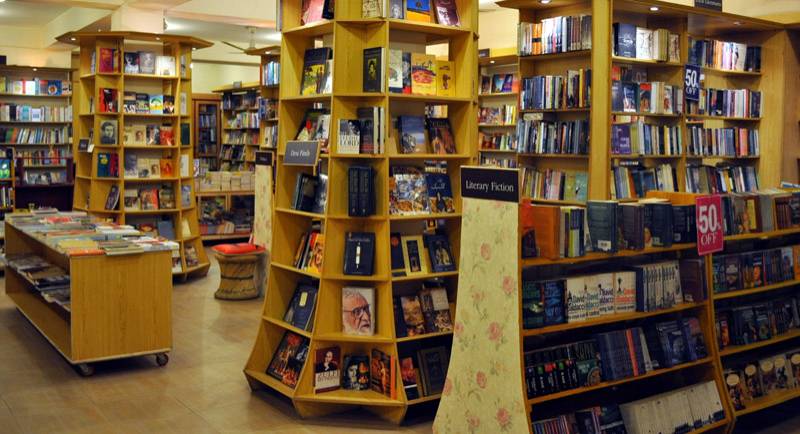
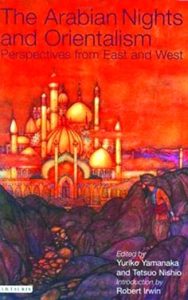
Arabian Nights and Orientalism: Perspectives from East and West
Yuriko Yamanaka, Tetsuo Nishio
I.B.Tauris (2006)
To commemorate the tercentenary of the first Western edition of The Arabian Nights, Yamanaka and Nishio marry Western and Japanese perspectives to analyze the rich cross-cultural fertilization that ensued. Arabian Nights and Orientalism examines narrative motifs, and relates them to other cultures, traditions, and forms of representation. The authors place the tales in a whole range of new contexts, from 19th century British feminism to ancient Greek romance. This lavishly illustrated book explores the interplay between image and text in various editions, and sheds new light on the tales’ origin in the Persian professional storytelling tradition. Robert Irwin’s foreword offers an overview of critical responses to The Arabian Nights, which highlights the originality of this volume.
Yuriko Yamanaka and Tetsuo Nishio are associate professors at the National Museum of Ethnology, Japan. Robert Irwin has taught Arabic and Middle Eastern History at the universities of Oxford, Cambridge and London. He is also the Middle East Editor for the Times Literary Supplement and the author of The Arabian Nights: A Companion (Tauris Parke Paperbacks).
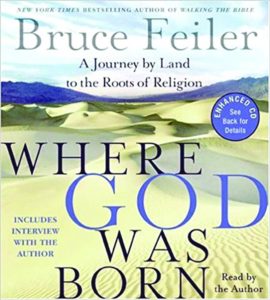
Where God was born: a journey by land to the roots of religion
Bruce S. Feiler
William Morrow (2005)
At a time when America debates its values and the world braces for religious war, Feiler travels ten thousand miles through the heart of the Middle East and examines the question: Is religion tearing us apart, or can it bring us together? Taking readers to sites not seen by Westerners for decades, Feiler’s journey uncovers little-known details about the common roots of Judaism, Christianity, and Islam, and affirms the importance of the Bible in today’s world. In Israel, he treks through secret underground tunnels and locates the spot where David toppled Goliath. In Iraq, he visits the Garden of Eden and the birthplace of Abraham, and makes a life-threatening trip to the rivers of Babylon. In Iran, he explores the home of the Bible’s first messiah and uncovers the secret burial place of Queen Esther. Feiler’s bold realization is that the Bible argues for interfaith harmony
Bruce Feiler is an American writer and television personality. He is the author of 12 books, including six consecutive New York Times nonfiction best-sellers.
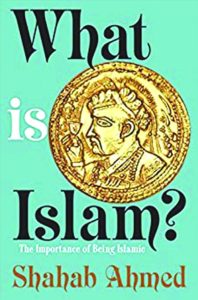
What is Islam? The Importance of Being Islamic
Shahab Ahmed
Princeton University Press (2016)
What is Islam? How do we grasp a human and historical phenomenon characterized by such variety and contradiction? What is “Islamic” about Islamic philosophy or Islamic art? Should we speak of Islam or of islams? Should we distinguish the Islamic (the religious) from the Islamicate (the cultural)? Or should we abandon “Islamic” altogether as an analytical term? In What Is Islam?, Shahab Ahmed presents a bold new conceptualization of Islam that challenges dominant understandings grounded in the categories of “religion” and “culture” or those that privilege law and scripture. He argues that these modes of thinking obstruct us from understanding Islam, distorting it, diminishing it, and rendering it incoherent. What Is Islam? formulates a new conceptual language for analyzing Islam. It presents a new paradigm of how Muslims have historically understood divine revelation—one that enables us to understand how and why Muslims through history have embraced values such as exploration, ambiguity, aestheticization, polyvalence, and relativism, as well as practices such as figural art, music, and even wine drinking as Islamic. It also puts forward a new understanding of the historical constitution of Islamic law and its relationship to philosophical ethics and political theory. A book that is certain to provoke debate and significantly alter our understanding of Islam, What Is Islam? reveals how Muslims have historically conceived of and lived with Islam as norms and truths that are at once contradictory yet coherent.
Shahab Ahmed was a Pakistani-American scholar of Islam at Harvard University.
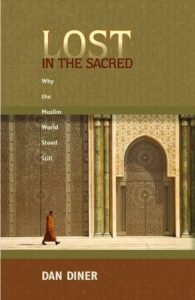
Lost in the Sacred: Why the Muslim World Stood Still
Dan Diner
Princeton University Press (2009)
Lost in the Sacred poses questions about the Muslim world that no other book by a Western writer has dared to ask. Focusing on the Arab Middle East, Dan Diner asks what caused the Muslim world to lag behind so dramatically. Is Western dominance to blame? Or is the problem even with Islam itself? These questions, however unsettling, need to be asked—and they are being posed all across the Muslim world today. This book provides cautious answers that are no less disturbing than the questions.
Diner argues that Islam’s cultural stasis is not due to the Muslim faith itself, but to the nature of the sacred it is infused with and that penetrates every aspect of life—spiritual and material. He reveals how the sacred in Islam suspends the acceleration of social time, hinders change, and circumvents secularization and modernity. Diner takes readers on an unforgettable intellectual journey, from today’s global conflicts back into the distant past. He describes the Muslim encounter with the emerging West in early modernity, the challenges Western imperial expansion posed in the nineteenth and twentieth centuries, the time-suspending impact of Arabic as a sacred language, the prevention of print, the classical age of Islam with its dazzling heights of learning and culture—and much more. Diner traces an entangled perspective, combining the spiritual with the social, and the cultural with the political. Throughout, he draws our attention to the urgent need for secularization and modernization in Islam.
The Muslim world is in crisis. Lost in the Sacred explains why.
Dan Diner is professor of modern history at the Hebrew University of Jerusalem and director of the Simon Dubnow Institute for Jewish History and Culture at the University of Leipzig. His books include Beyond the Conceivable: Studies on Germany, Nazism, and the Holocaust and Cataclysms: A History of the Twentieth Century from Europe’s Edge.
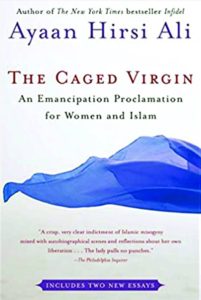
The Caged Virgin: An Emancipation Proclamation for Women and Islam
Ayaan Hirsi Ali
Simon and Schuster (2006)
Muslims who explore sources of morality other than Islam are threatened with death, and Muslim women who escape the virgins’ cage are branded whores. So asserts Ayaan Hirsi Ali’s profound meditation on Islam and the role of women, the rights of the individual, the roots of fanaticism, and Western policies toward Islamic countries and immigrant communities. Hard-hitting, outspoken, and controversial, The Caged Virgin is a call to arms for the emancipation of women from a brutal religious and cultural oppression and from an outdated cult of virginity. It is a defiant call for clear thinking and for an Islamic Enlightenment. But it is also the courageous story of how Hirsi Ali herself fought back against everyone who tried to force her to submit to a traditional Muslim woman’s life and how she became a voice of reform.
Born in Somalia and raised Muslim, but outraged by her religion’s hostility toward women, Hirsi Ali escaped an arranged marriage to a distant relative and fled to the Netherlands. There, she learned Dutch, worked as an interpreter in abortion clinics and shelters for battered women, earned a college degree, and started a career in politics as a Dutch parliamentarian. In November 2004, the violent murder on an Amsterdam street of Dutch filmmaker Theo van Gogh, with whom Hirsi Ali had written a film about women and Islam called Submission, changed her life. Threatened by the same group that slew van Gogh, Hirsi Ali now has round-the-clock protection, but has not allowed these circumstances to compromise her fierce criticism of the treatment of Muslim women, of Islamic governments’ attempts to silence any questioning of their traditions, and of Western governments’ blind tolerance of practices such as genital mutilation and forced marriages of female minors occurring in their countries.
Hirsi Ali relates her experiences as a Muslim woman so that oppressed Muslim women can take heart and seek their own liberation. Drawing on her love of reason and the Enlightenment philosophers on whose principles democracy was founded, she presents her firsthand knowledge of the Islamic worldview and advises Westerners how best to address the great divide that currently exists between the West and Islamic nations and between Muslim immigrants and their adopted countries.
An international bestseller — with updated information for American readers and two new essays added for this edition — The Caged Virgin is a compelling, courageous, eye-opening work.
Ayaan Hirsi Ali was born in Mogadishu, Somalia, was raised Muslim, and spent her childhood and young adulthood in Africa and Saudi Arabia. In 1992, Hirsi Ali came to the Netherlands as a refugee. She earned her college degree in political science and worked for the Dutch Labor party. She denounced Islam after the September 11 terrorist attacks and now serves as a Dutch parliamentarian, fighting for the rights of Muslim women in Europe, the enlightenment of Islam, and security in the West.

